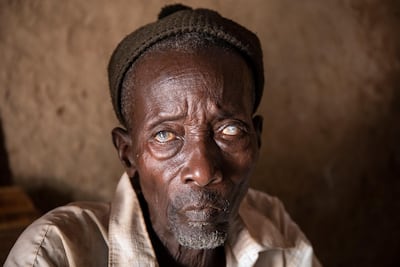It is less than the price of a can of soda, but a Dh2 donation can fight diseases that cause blindness and misery among some of the world's poorest communities.
That is the message of a campaign launched on Monday that calls on everyone to play their part in preventing and eradicating illnesses that afflict around 200 million people.
The Reach Campaign will target neglected tropical diseases, which are little known in the wider world but devastating for sufferers.
Two of the worst are river blindness and lymphatic filariasis, which can lead to the better known elephantiasis. Both are caused by parasitic worms carried by flying insects.
In the case of lymphatic filariasis, it can cause severe swelling of the body and is transmitted by mosquitoes.
River blindness is caused by repeated bites by black flies that live near flowing water. It can cause severe skin problems and the loss of sight after the age of 30.
Adults left without sight by river blindness are often unable to work while their children must abandon their schooling to care for them, only adding to the cycle of poverty. Most of the cases are found in 31 countries in sub-Saharan Africa.
The new campaign uses the theme Give 2, Save 2 – meaning that a Dh2 donation is enough to provide the medicine and treatment to protect one person against both diseases for an entire year.
As well as giving cash, donors can show their support on social media by posting photographs of themselves holding two fingers to their eyes in a “V”, and using the hashtag “reachtheend.”
Emirates Red Crescent is organising fund-raising activities in the UAE, with backing from founding partners Etihad Airlines and Abu Dhabi National Oil Company.
Other supporters include Yas Marina Circuit, Aldar Properties, the Abu Dhabi Department of Municipalities and Transport, Flash Entertainment, Miral and UAE Exchange.
As well as raising vital funding, the month-long campaign also seeks to educate the public and raise awareness of neglected tropical diseases.
The UAE's culture is "one of generosity", said Nassar Al Mubarak, spokesman for The Reach Campaign.
“We recognise our responsibility to help those around the world that suffer from preventable diseases,” he said.

"This campaign is a platform for the UAE to come together as a community around the very tangible goal of ending river blindness and thus improving the lives of millions around the world."
Dr Mohamed Al Falahi, secretary general of the Emirates Red Crescent Authority, said his organisation was happy to be a strategic partner in the fight against the diseases.
“River blindness is a threat to human development in the countries it affects, especially in Africa, and hinders its governments' efforts to achieving development and desired progress,” he said.
In the first phase of the campaign, donations can be made online via Emirates Red Crescent or through text message, kiosks, ATM machines and donation boxes.
Later, more partner activities will be announced as the message is expanded to reach a global audience.
All the information can be found on the Reach website and using the social media handle, @reachtheendorg.
At the heart of the campaign is the Reaching the Last Mile Fund, a 10-year, $100 million (Dh367.3m) initiative established in 2017 by Sheikh Mohamed bin Zayed, Crown Prince of Abu Dhabi and Deputy Supreme Commander of the Armed Forces, along with other supporters.
Run by the End Fund, it offers treatment and preventive measures across seven countries in Africa – Chad, Ethiopia, Mali, Niger, Senegal, Sudan and Yemen – and the Middle East.
It has been estimated that the fight to eliminate river blindness in Africa could generate up to $6 billion in economic benefits across the continent.
Last year, the Reaching the Last Mile Fund delivered over 13.5 million treatments for river blindness and lymphatic filariasis, and trained 76,000 healthcare workers.
The UAE's commitment to fighting neglected tropical diseases goes back to 1990, when Sheikh Zayed, the Founding Father, made a personal donation of $5.77m to the Carter Centre, founded by former US president Jimmy Carter, to help eradicate the Guinea worm disease.
Three decades later, the disease has been reduced from more three million cases to less than 50, amid hopes that it could be the first to be completely eliminated.


